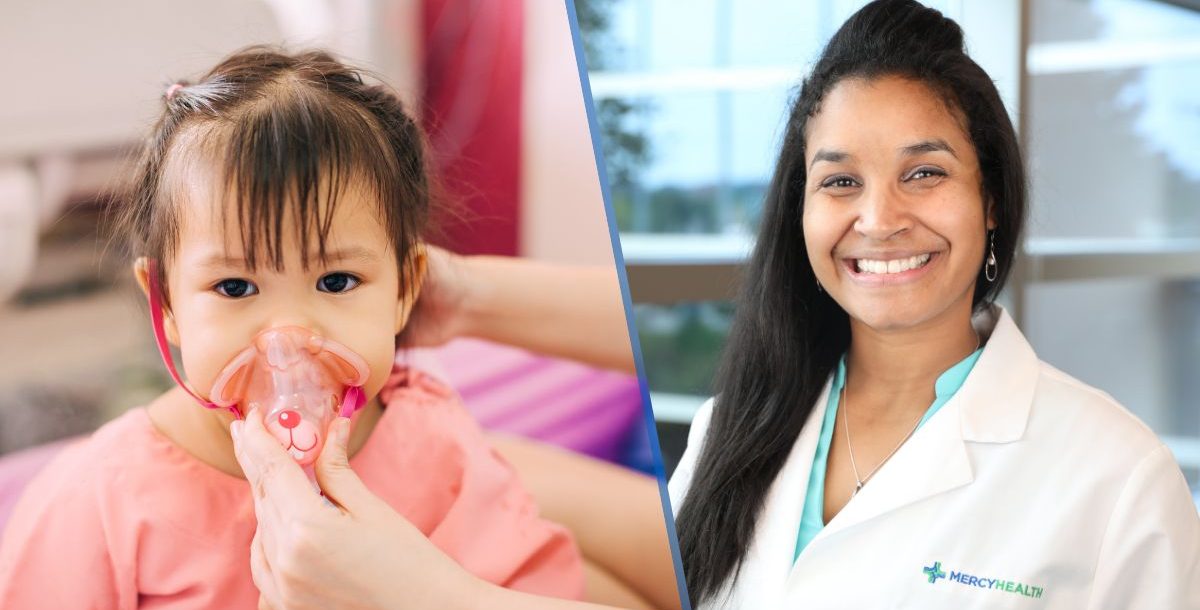Pneumonia is a severe illness that affects children worldwide, often leading to hospitalization. As for the viruses that can lead to pneumonia, influenza, respiratory syncytial virus (RSV) and COVID-19 are all notable contributors.
Tamara Huson, MD, a primary care provider at Mercy Health – Loveland Primary Care, has been kind enough to share some valuable insights on preventing pneumonia in children. She believes by implementing simple measures, parents can significantly reduce the chances of their little one contracting this potentially life-threatening condition.
Know the risk factors for pneumonia in children
Recognizing risk factors is a crucial step so parents can take appropriate preventive measures.
The following types of children are at higher risk when it comes to contracting pneumonia:
- Children under the age of 7, especially infants and preschoolers
- Children with weakened immune systems
- Children without a spleen
- Children with underlying health conditions, such as asthma, cystic fibrosis, sickle cell disease, heart problems or diabetes
Consider public face mask-wearing
“While routine mask-wearing is not recommended for preventing pneumonia in children, it can be considered in specific situations,” Dr. Huson shares. “Although getting your children to wear masks consistently may be challenging, this precautionary measure can provide an added layer of protection.”
Consider having your child wear a face mask when visiting health care facilities or in crowded, public areas where the risk of exposure to respiratory infections is higher.
Just remember that for safety reasons, face masks should never be worn by children if they are younger than 2 years old.
Always remember handwashing
Handwashing is a simple yet effective tool in preventing infections, including pneumonia. Encourage children to wash their hands for at least 30 seconds using soap, water or alcohol-based hand sanitizers constantly throughout their day.
“For younger children, supervision and making handwashing fun by singing “Happy Birthday” twice can help instill good hygiene practices,” Dr. Huson adds.
Invest in a humidifier
The winter months bring an increased risk of respiratory infections due to various factors, such as crowding, reduced sunlight exposure and changes in humidity levels. To combat these risks, Dr. Huson recommends using a humidifier at home when the heater is on to help keep your child’s airways moisturized.
Stay updated on vaccines
Vaccines play a vital role in preventing pneumonia caused by bacteria and viruses.
“Vaccinations against Streptococcus pneumoniae, Haemophilus influenzae type b, influenza and COVID-19 can significantly reduce the risk of pneumonia in children,” Dr. Huson shares.
Please consult your child’s doctor to determine the appropriate vaccines based on age, medical history and current recommendations.
Eliminate cigarettes
Exposure to cigarette smoke, whether firsthand, secondhand or thirdhand, significantly increases the risk of pneumonia, particularly in infants under 1 year of age. Likewise, it is linked to sudden infant death syndrome (SIDS) in these vulnerable patients.
“I advise parents to discuss smoking cessation options with their own health care provider to protect their child’s health and reduce the risk of pneumonia,” Dr. Huson says.
What should I do if I think my child has pneumonia?
Parents should stay on high alert when it comes to identifying potential signs of pneumonia in their children. If your child experiences a worsening cough, fever, shortness of breath, wheezing or struggles to breathe, immediate medical attention is necessary. This is especially crucial if the child has not completed all their vaccinations, has been exposed to someone with pneumonia or if any other concerning symptoms arise.
“Regardless of the suspected cause, any suspicion of pneumonia requires prompt medical evaluation,” Dr. Huson adds.
While mild cases of pneumonia can often be managed in your child’s pediatrician’s office, more severe symptoms may require a visit to the emergency room for specialized care, including oxygen therapy and intravenous antibiotics.
By implementing these preventive measures, parents can help protect their children’s health and reduce the risk of severe illness and hospitalization due to pneumonia.
Learn more about pneumonia as well as the primary care services we provide at Mercy Health.






